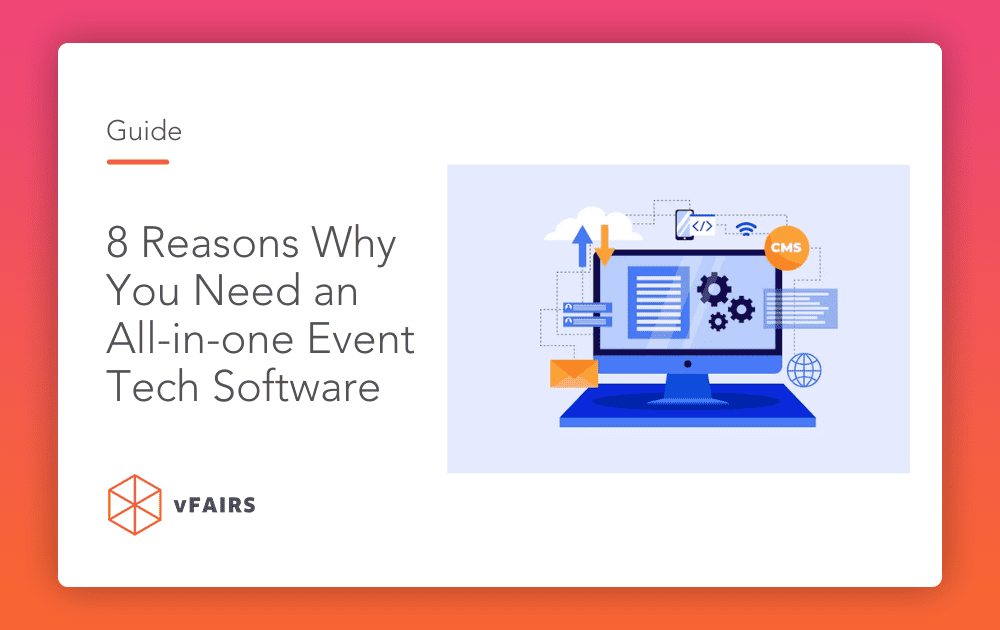Imagine you’re at a huge conference, and everyone is seamlessly navigating their way through the event using just their smartphones. Remote attendees are present virtually from across the globe, in-person attendees enter the venue with a swift QR code scan. They can instantly access tailored event schedules, and participate in interactive sessions. Moreover, event organizers monitor real-time data to ensure a flawless experience.
This vivid image exemplifies the power of event tech, the driving force behind today’s successful gatherings, meetings, and conferences.
What is Event Technology?
Event technology, often referred to as event tech, includes a wide range of digital tools and software designed to facilitate and improve the various aspects of event planning, management, and execution. Think of it as a toolbox that event organizers use to create unforgettable experiences for attendees.
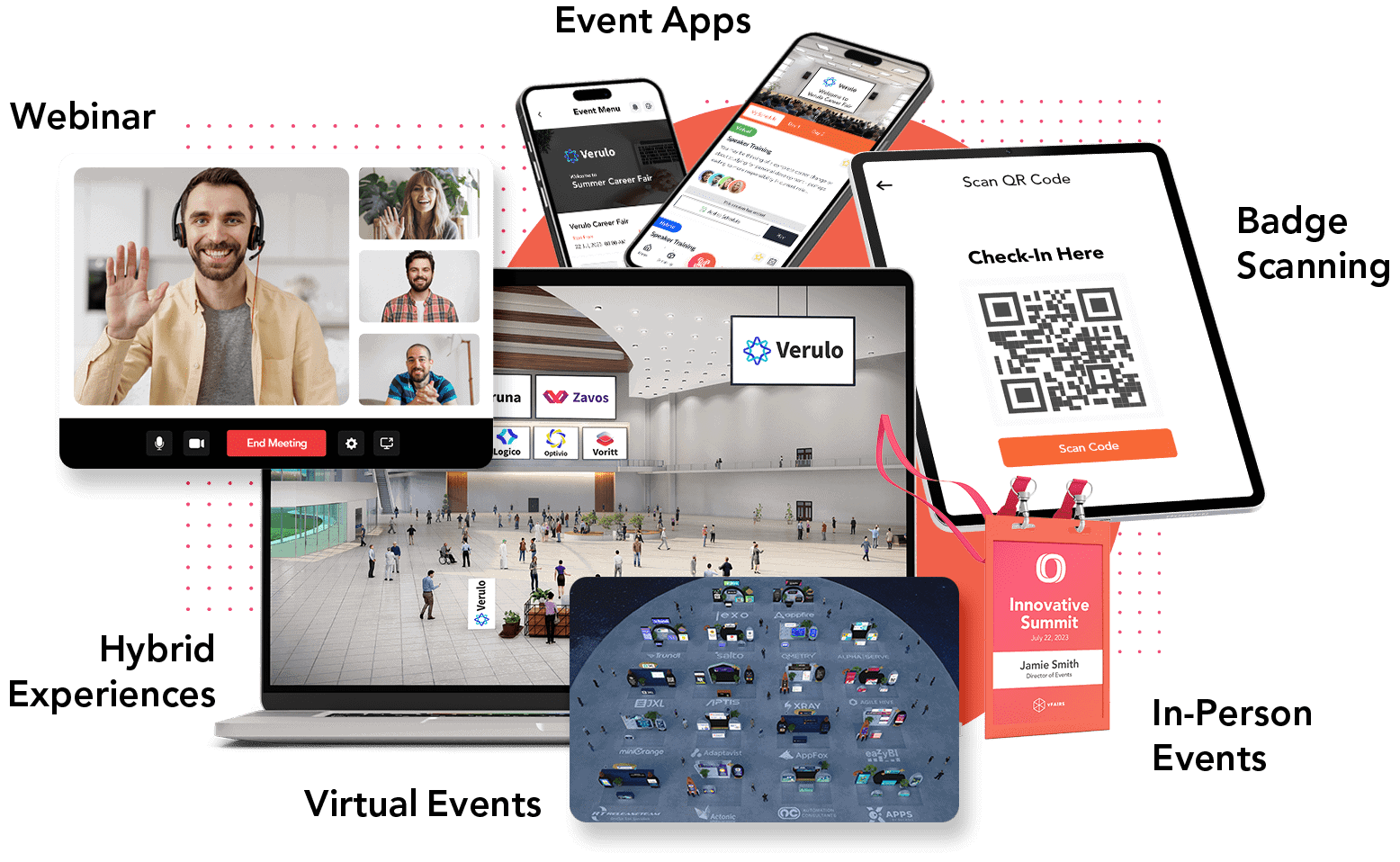
The Evolving Landscape of Event Tech
Event technology is not static; it’s a dynamic field that continually evolves to meet the changing demands of the industry and the preferences of attendees. Keeping a pulse on event technology trends is crucial for staying competitive in the field of event management.
For instance, the global pandemic witnessed a surge in new technology for events. This led event tech companies to quickly create online platforms that mimic in-person experiences, making it possible to reach a broader audience.
While virtual events remain relevant post-pandemic, there’s been a shift in focus in terms of event technology. To serve a hybrid and in-person audience, we are seeing advancements in mobile apps like lead capture, badge printing and scanning as well as event apps.
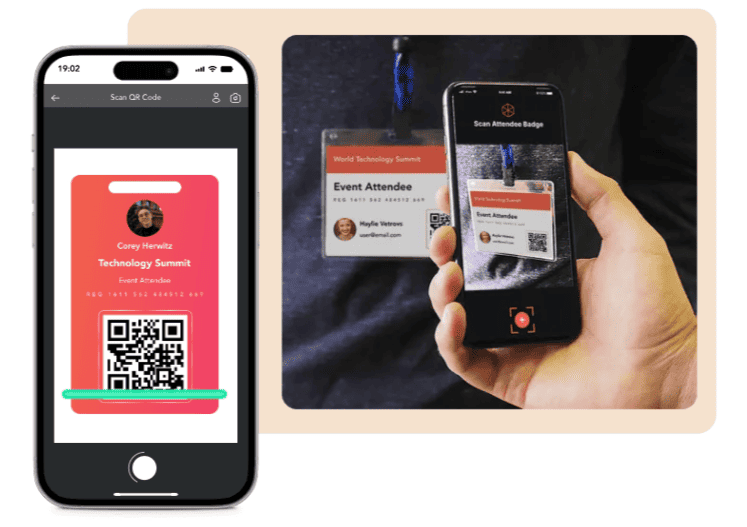
Innovations like Artificial intelligence (AI) and augmented reality (AR) are more commonly incorporated into event engagement technology. They offer personalized content suggestions, boost engagement, and create immersive experiences. These advancements are changing how attendees engage with events.
Overall, staying in the loop with the latest trends is a must for event professionals. The rise of AI is making events more personalized and efficient. It’s also becoming common to find tech elements in traditional, in-person events. Virtual events are not just about attendance; they’re transforming how companies handle things like team-building and training. Lastly, flexibility is the name of the game, as attendees want options for fully virtual, hybrid, or in-person experiences. Staying with the times and embracing innovation is key to creating standout events and staying competitive in the field. The future holds exciting possibilities as technology continues to reshape the event landscape.
Event Tech’s Versatility
From small business gatherings to large-scale conferences, event tech has reshaped how events are planned, executed, and experienced. It serves as the driving force behind innovation, efficiency, and enhanced attendee engagement.
The landscape of event management tools is diverse, offering solutions tailored to various needs and preferences. However, this diversity can sometimes be overwhelming, especially for small business owners or those new to the world of event planning. The abundance of choices and features may leave them wanting to know which tools are truly essential for their specific event.
It’s important to recognize that not all events require an extensive suite of event tech features, and investing in overly complex tools can be impractical. This complexity may lead to unnecessary expenses and a steeper learning curve, potentially dissuading some users from fully embracing event technology.
For companies that frequently organize events, the solution lies in adopting a comprehensive all-in-one event management technology that streamlines the entire process. Such platforms are designed to provide a unified and user-friendly experience, simplifying event planning and execution.
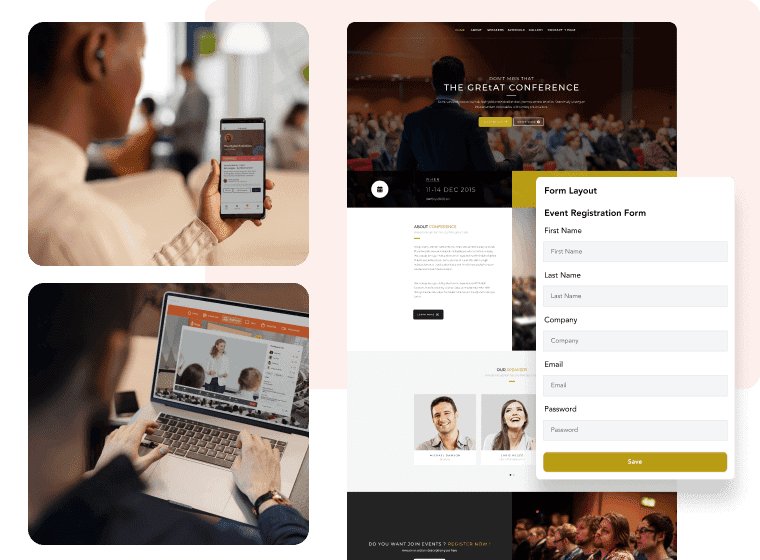
Benefits of All-in-One Event Technology
All-in-one event technology covers everything from event registration and ticketing to marketing, attendee engagement, and data analytics. This consolidation of features into a single platform not only saves time and resources but also ensures seamless integration and data flow between different aspects of event management.
By opting for an all-in-one event technology solution, businesses can access a suite of tools and functionalities within a single platform. This not only reduces the complexity of managing multiple tools but also offers cost-efficiency and a consistent user experience.
All-in-one event tech is reshaping the very foundations of event planning and execution. Let’s delve deeper into a comprehensive understanding of its advantages.
1. Streamlined Event Planning
One of the standout advantages of all-in-one event tech is its ability to streamline the event planning process. Rather than juggling multiple tools and systems for tasks like registration, ticketing, marketing, and communication, event planners can access all these functionalities from a single platform. This not only saves time but also reduces the risk of errors and inconsistencies, ensuring a smoother and more efficient planning phase.
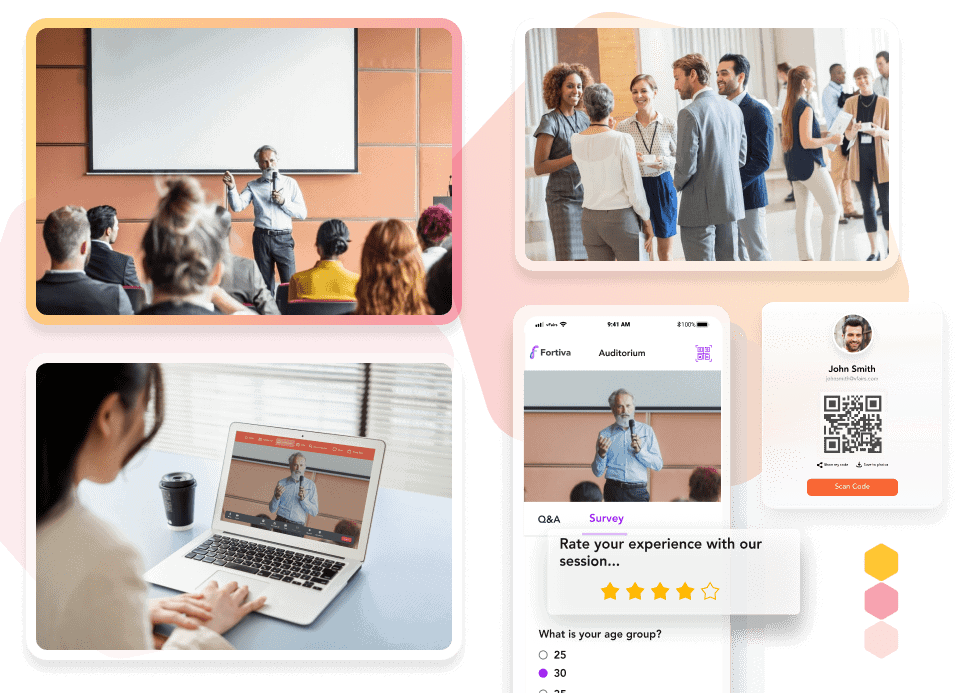
2. Cost-Efficient Event Management
Cost-effectiveness is another significant perk of all-in-one event tech. By consolidating various tools and services into one platform, businesses can significantly reduce their expenses. They no longer need to invest in and manage multiple subscriptions, which can quickly add up. This cost-efficient approach allows organizations to allocate their budgets more wisely, focusing resources on other critical aspects of their events.
3. Improved User Experience
For event hosts and organizers, an improved user experience is essential for seamless event management. All-in-one event tech provides just that; a cohesive, user-friendly interface that simplifies tasks. Event planners can effortlessly navigate through various features, customize settings, and monitor event progress in real time. This enhanced user experience translates into smoother operations and a more positive overall event management experience.
4. Better Attendee Experience
All-in-one event technology service is designed not only for event organizers but also with attendees in mind. It offers various touch points throughout the attendee journey, making it easier for participants to engage with the event. From registration and personalized schedules to interactive sessions and networking opportunities, attendees benefit from an integrated experience that keeps them engaged and satisfied.
5. Simplified Compliance with One Vendor
Managing compliance and data security can be daunting when dealing with multiple vendors and tools. With all-in-one event planning technology, you can significantly reduce this headache. Organizations have a single vendor to coordinate with, simplifying compliance procedures and data management. This not only ensures security but also eases the administrative burden on event organizers.
6. User-Friendly Interface
The simplicity and intuitiveness of an all-in-one event tech platform are crucial for successful event management. Event planners, regardless of their technical proficiency, can easily adapt to and use the platform efficiently. This user-friendliness minimizes training time and maximizes productivity.
7. Scalability for All Event Sizes
Whether organizing a small corporate meeting or a large-scale international conference, all-in-one event tech can adapt to the event’s size and complexity. It offers scalability that allows event planners to cater to their specific needs, ensuring that the platform remains a valuable tool regardless of the event’s scale.
8. Creative Customization and Experimentation Time
Finally, all-in-one event tech empowers event organizers with the luxury of time for creativity and experimentation. With streamlined processes, reduced administrative tasks, and accessible attendee engagement tools, planners can devote more time to customizing and enhancing the event experience. This freedom fosters innovation and allows for unique, memorable events that stand out in a crowded marketplace.
Key Considerations When Choosing an All-in-One Event Technology Provider
Selecting the right all-in-one event tech is vital to the success of an event. The market offers a wide array of options, making it essential to assess your choices carefully. Let’s walk through the essential factors to weigh when selecting an all-in-one event technology service. From evaluating costs to prioritizing data security, here’s a comprehensive roadmap to ensure your choice aligns perfectly with your event management requirements and objectives.
Cost Evaluation
Cost is a crucial factor when choosing an all-in-one event tech. Begin by assessing your budget and understanding the pricing structures of the solutions available. Consider not just the initial costs but also any ongoing expenses, such as subscription fees or additional charges for features.
Opt for event technology providers that offer transparent pricing models. Hidden fees or unclear pricing structures can lead to budget overruns and frustration. Request detailed pricing information and clarification on any potential additional costs to make an informed decision. A clear understanding of the total cost of ownership is essential to avoid unexpected financial burdens down the road.
Tool and Device Compatibility
Ensure that the solution you choose is compatible with the tools and devices you currently use or plan to incorporate. Compatibility issues can lead to integration challenges and hinder the seamless flow of data and information. Verify that the event tech platform can integrate smoothly with your existing systems, reducing the risk of operational disruptions.
Data Security and Compliance
Data security is non-negotiable, especially when handling sensitive attendee information. Prioritize software solutions that adhere to stringent security protocols and compliance standards, such as GDPR or HIPAA, depending on your event type. Ensure that the software vendor has robust measures in place to protect your data and the data of your attendees.
Ease of Use and Implementation
User-friendliness is a critical factor, as an intuitive interface can significantly impact the efficiency of your event management. Assess the ease of use and implementation by requesting demos or trials. A solution that is easy to navigate and implement can save you time and resources during the onboarding process.
Customization Possibilities
Every event is unique, and your software should be adaptable to your specific needs. Consider the customization options available within the software. The ability to tailor the software to match your event’s branding and requirements can be a game-changer in delivering a personalized attendee experience.
Some software solutions offer more autonomy, allowing you to tailor the platform to your specific needs. Assess whether the software aligns with your desired level of control and customization.
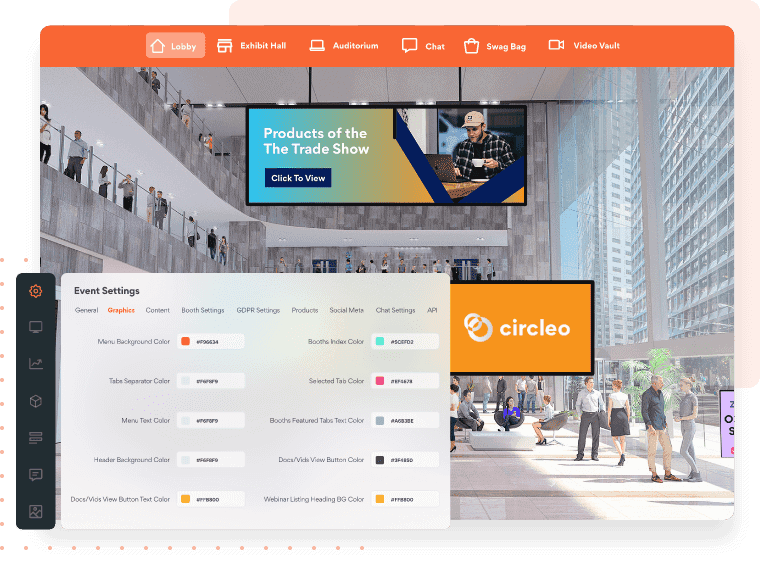
Scalability for Future Expansion
As your events grow and evolve, your event tech should grow with you. Choose an event management technology that offers scalability, enabling you to expand and adapt to changing event requirements. This scalability ensures that your investment remains valuable in the long run.
Customer Support
Reliable customer support is essential when you encounter issues or have questions about the software. Evaluate the level of customer support offered by the event tech vendor, including response times, availability, and support channels. Prompt and helpful customer support can save you time and frustration in the event of challenges.
How to Choose the Right Event Technology
The choice of event technology can significantly impact the outcome of your event. It’s a decision that requires thoughtful consideration and a strategic approach. Here’s what you need to do:
Assess Your Event Tech Needs
Before diving into the sea of event technology options, it’s crucial to start by assessing your specific needs. Consider the nature and scale of your event, the goals you wish to achieve, and the challenges you aim to overcome. Identifying these needs provides a clear framework for evaluating potential solutions.
Also, decide if you’d rather do things on your own or if you need some extra help. Some event tech tools are all about self-service, while others come with built-in support. Your choice should match your team’s skills and how much assistance you think you’ll need.
Collect Peer Reviews and Recommendations
Lean into your network to solicit reviews and recommendations from those who’ve used technology for events. Their insights can provide valuable perspectives on the practical use and effectiveness of different solutions.
Try Demos and Trials
Don’t commit to event technology blindly. Many providers offer demos and trials of their software. Take advantage of these opportunities to test drive the technology and gain a hands-on understanding of how it works. This firsthand experience can reveal whether the software aligns with your expectations and workflow.
Some providers go the extra mile by offering product tours, granting you the freedom to explore their solutions without the need for direct sales interactions. vFairs, for instance, offers a quick demo, allowing you to get a sneak peek into the platform’s capabilities and interface.
Want to know more about vFairs? Book a demo now.
Collect Stakeholder Input
Incorporate the input of all relevant stakeholders within your organization. Different team members may have varying requirements or perspectives on what constitutes the ideal event technology. By gathering their input and insights, you ensure that the selected technology caters to the diverse needs of your team.
Make an Informed Decision
Finally, with a thorough understanding of your needs, insights from peers, and firsthand experience with demos or trials, you’re equipped to make an informed decision. Evaluate each option based on factors like cost, features, user-friendliness, and scalability. Choose the technology that best aligns with your event objectives and overall strategy.
vFairs is a reliable and comprehensive all-in-one event technology solution that streamlines event planning and execution. With vFairs, you gain access to a suite of essential features that can transform your events into seamless and unforgettable experiences. Contact us to know more about how our event tech can help you supercharge your events.
FAQs
What are some key features to look for in event technology for exhibitors?
Important features include virtual booths, lead capture tools, analytics for measuring booth performance, integration with event apps, and interactive content capabilities. The right technology should empower exhibitors to connect with attendees and gather data effectively.
What does "innovation in events" mean, and why is it important?
Innovation in events refers to the adoption of creative, novel approaches and technologies to enhance the attendee experience, streamline event management, and achieve unique event objectives. It's vital for staying competitive, engaging audiences, and adapting to changing industry demands.
How can I incorporate event innovation into my next event?
To integrate innovation into your event, start by identifying your specific event goals and audience expectations. Explore new technologies, consider creative event formats, and stay informed about industry trends. Collaborate with event tech providers, industry experts, and your team to brainstorm and implement innovative solutions.


